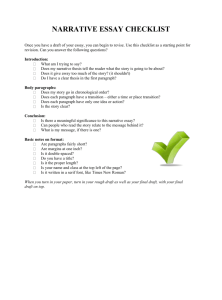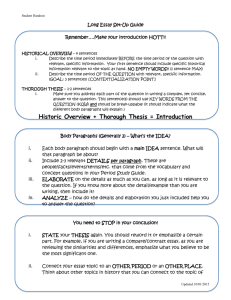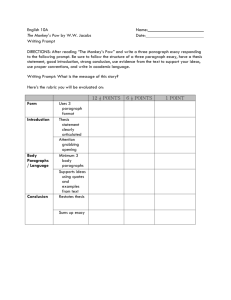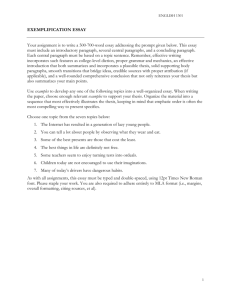Writing a Well-Constructed Essay
advertisement
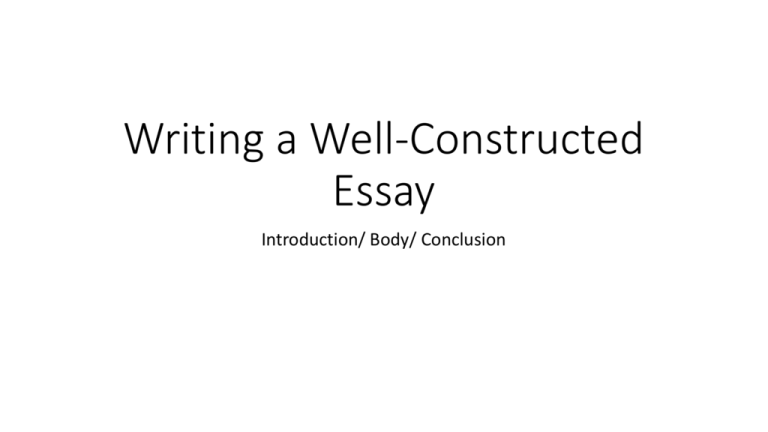
Writing a Well-Constructed Essay Introduction/ Body/ Conclusion Rules to Consider Before, During, and After Writing • Never use 1st or 2nd person pronouns when writing a formal essay • Unless you are writing a creative piece keep it professional and formal • Keep your audience in mind • Always assume they DON’T know ANYTHING • Research your topic don’t just assume you know the answer • Your essay is more believable and correct if people who are published can verify your information • Did you support your statements with direct quotes? • Introduce, “QUOTE” (cite). • Did you spell check? • Did you put it in the proper format? • Did you cite all of your sources? • In-text • Works Cited Page? The Funnel Introduction Opening Statement Grab the reader’s attention and draw him/her into your thinking Do not use “you” or implied “you” (Never directly address the reader) Do not give away the topic of the essay Do not give away your position/opinion Funnel Sentences • Narrow down your broad opening statement • Specifically work towards your thesis • Avoid giving away your position too early • Begin to address the specific topic right before the thesis Thesis Statement • Two key parts: Topic and Assertion Topic-what will you be writing about in the essay Assertion- what will you be trying to prove in the essay Main idea for the entire essay Last sentence of introductory paragraph Never contain “I think, I believe, I feel, In my opinion” Worded as fact (even if it is an opinion) May contain the three supporting ideas or reasons from body Other Key Points (Thesis) • Get in, explain, and give your opinion. • The introduction is not a summary. • All of the necessary introduction items will fit into one paragraph • DO NOT use phrases such as “the topic of this essay…” or “the thesis argued is…” or “I’m going to be talking about…” Knowing the general structure of the rest of your paper will help you create your thesis and write your introduction SO WHAT SHOULD YOU DO FIRST? Body Paragraphs Creating a Body Paragraph • Brainstorm-create list of ideas • Categorize-use graphic organizers • Research-be sure you’re dealing with fact • Outline-organize into possible paragraphs • Write- compose body paragraphs • Transition-move from ideas flawlessly Transition Sentences • You do not transition after the THESIS • You do not transition before the CONCLUSION • Every other body paragraph should contain a transition • Transitions take an idea from one paragraph and connects it to the next Practice Topic Let’s say that the topic is… “All high school students should wear uniforms.” 1st decide if you agree or disagree(form an opinion) then start to brainstorm. Brainstorm a. Wearing uniforms is simpler b. Wearing uniforms creates equality c. Wearing uniforms creates unity Categorize and Research Principals Principals don’t have to waste so much time monitoring student dress. Simpler Students Students don’t have to waste time deciding what they are going to wear to school. Parents Parents don’t have to spend a lot of money or time looking for expensive brand clothing. Sample Paragraph Wearing uniforms makes it much simpler for everyone involved. First, the principal does not have to deal with issues concerning the dress code. Parents don’t have to worry about purchasing designer clothes that will be out of fashion in less than 6 months. Finally, students don’t need a lot of time to plan what they’re going to wear each day. What’s missing? The Conclusion Paragraph Function of the conclusion Tells purpose of essay Summarizes without listing the points covered in the essay. Creates a broader implication • why should world or the audience care? Conclusion Paragraph • Begin with a restatement of the thesis • not a repetition, and gradually widens toward a final , broad statement of implication. • Borrow from the body paragraphs • without being flatly repetitive or listing points already covered. • Reinforce analysis/ ideas (This true because..) • Creates echoes of the introduction and body paragraphs ` • Move outward-(The world should care because…) a broader implication so the reader can see the analytical focus in a larger perspective or application. Things to Avoid in a Conclusion Avoid first-person point of view Avoid simply repeating the thesis and/or listing the main points. Don’t conclude more than you reasonably can from the evidence you have presented. Avoid any attempts at humor, cuteness, or sarcasm. Sample Conclusion Restatement of the thesis: Throughout Morrison’s Beloved memory has a power distinguished from other motifs in the novel. Borrow from the body paragraphs Memory is so pervasive that it functions as a separate character within the plot. It interacts with, and has a unique relationship with, each character; it brings up painful past experiences, and preys upon those resonances. Reinforce analysis/ ideas Indeed, memory functions as an additional antagonist, dredging up the past, teasing and torturing without remorse the characters who attempt to forget. Move outward Ultimately, however, memory is defeated with Morrison’s dictate: “this is not a story to pass on.”


